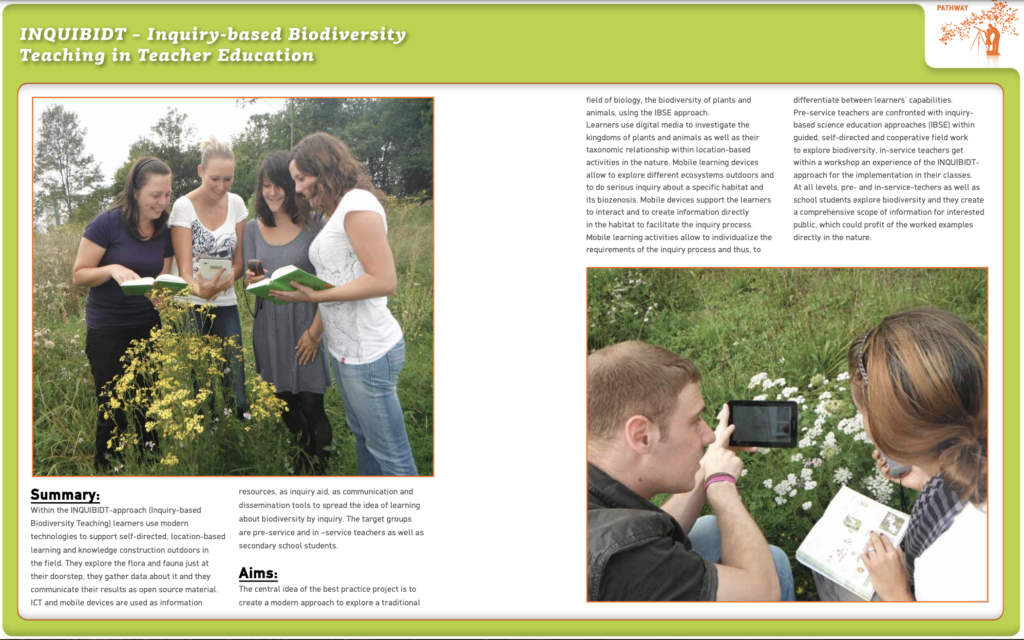Strategies – Evidence-based strategy
 The major goal of the “evidence-based” strategy is to help science teachers develop expertise in the effective introduction of inquiry in their practice. Another important goal is to develop teachers’ “scholarship of teaching”, which refers to the ability of teachers to present in public their teaching in such a way that others will learn from it. This element is expressed in teachers’ ability to reflect, to present evidence, and collaborate with their peers and is an important aspect of creating communities of practice. This strategy has been investigated in many EU countries (Sotiriou et al., 2017). As an example, we refer here to the INQUIBIDT programme. The course starts with an introduction to the system of plants and the biodiversity of local flora and fauna. Then the students work in small groups (expert groups) in different habitats in the surrounding of the university within a radius of 15 km, each group a specific site. Learners use Google Maps and GPS to find the habitats. The task of each group is to record the plants, to describe and to document them in a hidden Wiki online. Thus, the data is developed as an information resource on the internet for different specific habitats in which the results of all groups are summarised. Furthermore, the expert groups leave a geocache, in which a so-called QRcode (barcode readable by cell phones and smartphones) is located. This QRcode refers to the information on the project Wiki which can be viewed only on-site with mobile devices. In the next step, each group visits all habitats, which are chosen to be very different and have different living conditions (arid, humid, wetland, riverside, …). The groups again explore the habitats and they verify their results using the mobile devices via the QR codes. In the final step, the geocache coordinates are published on the Wiki to allow teachers with their students or even the interested public to explore the landscapes. The results of the research conducted on this program showed that the strategy contributed to the professional development of the teachers. They changed their pedagogical knowledge and content knowledge regarding inquiry teaching; their anxiety concerning the implementation of the sustainability citizenship approach was reduced; and they became more reflective and more aware of their practice.
The major goal of the “evidence-based” strategy is to help science teachers develop expertise in the effective introduction of inquiry in their practice. Another important goal is to develop teachers’ “scholarship of teaching”, which refers to the ability of teachers to present in public their teaching in such a way that others will learn from it. This element is expressed in teachers’ ability to reflect, to present evidence, and collaborate with their peers and is an important aspect of creating communities of practice. This strategy has been investigated in many EU countries (Sotiriou et al., 2017). As an example, we refer here to the INQUIBIDT programme. The course starts with an introduction to the system of plants and the biodiversity of local flora and fauna. Then the students work in small groups (expert groups) in different habitats in the surrounding of the university within a radius of 15 km, each group a specific site. Learners use Google Maps and GPS to find the habitats. The task of each group is to record the plants, to describe and to document them in a hidden Wiki online. Thus, the data is developed as an information resource on the internet for different specific habitats in which the results of all groups are summarised. Furthermore, the expert groups leave a geocache, in which a so-called QRcode (barcode readable by cell phones and smartphones) is located. This QRcode refers to the information on the project Wiki which can be viewed only on-site with mobile devices. In the next step, each group visits all habitats, which are chosen to be very different and have different living conditions (arid, humid, wetland, riverside, …). The groups again explore the habitats and they verify their results using the mobile devices via the QR codes. In the final step, the geocache coordinates are published on the Wiki to allow teachers with their students or even the interested public to explore the landscapes. The results of the research conducted on this program showed that the strategy contributed to the professional development of the teachers. They changed their pedagogical knowledge and content knowledge regarding inquiry teaching; their anxiety concerning the implementation of the sustainability citizenship approach was reduced; and they became more reflective and more aware of their practice.
References:
1 Comment
Submit a Comment
You must be logged in to post a comment.


This text reveals a very interesting example of how evidence-based research can transform teaching practice, especially in science education. The INQUIBIDT program demonstrates that involving teachers in active methodologies, such as fieldwork using technologies (Google Maps, QR codes), not only expands their technical knowledge but also reduces anxiety about implementing new pedagogical approaches, such as sustainability citizenship.
Personally, I believe this type of training is essential for teachers to feel confident and prepared to innovate in the classroom, bringing teaching closer to students’ realities. Continuous reflection on practice, combined with peer collaboration, creates a very rich and sustainable professional learning environment.
This model also values the connection between science, technology, and community, which is essential for forming conscious and active citizens. The role of the teacher here is much more than transmitting content; it is to be a mediator, a facilitator of learning, and an agent of change. It is in this transformation of the teacher that the true potential for educating for sustainability lies.